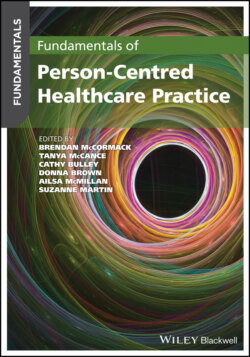Читать книгу Fundamentals of Person-Centred Healthcare Practice - Группа авторов - Страница 89
Human flourishing as psychological wellness
ОглавлениеSince the work of Aristotle, human flourishing has grown and developed as a way of capturing our humanness and indeed is the foundation of a branch of psychology called ‘positive psychology’. Positive psychologists argue that human flourishing in this context moves beyond the confines of ‘happiness’ (although this argument is flawed if we view happiness as eudaimonia!) and embraces a wide range of psychological constructs that offer insights into what it means to be happy and to feel well. The origins of such thinking arise from the work of Martin Seligman (2011) who postulated that flourishing arises when we pay attention to and deliberately set out to build and maintain the five components of the PERMA model, designed by him. The five components of the model are:
Positive emotions
Engagement
Relationships
Meaning
Accomplishments.
If we use the PERMA model as a framework for thinking about and reflecting on human flourishing and what that means for us, then we need to consider the following questions.
1 Overall, are our emotions more positive than negative?
2 How engaged are we with the parts of our life that are important to us, such as work or hobbies?
3 Do we have sufficient deep and meaningful relationships to sustain us in our lives?
4 Have we got a sense of purpose in our life, through which we create meaning?
5 Do we apply our talents, gifts and qualities as persons to achieving our goals and then celebrating these achievements (no matter how small)?
PERMA is a useful model for understanding human flourishing and for reflecting on ‘where we are at’ as spiritual beings. However, living a positive life (just the same as being person‐centred as we argued in Chapter 2) is not completely dependent on our own ways of being, actions, relationships and behaviours. The context in which we live our life also plays a key role. So, the success of flourishing is context dependent.
In their paper on engagement in the context of person‐centred practice, Dewing and McCormack (2015) argued that for staff to be fully engaged (or to flourish), the conditions necessary for engagement to happen need to be in place. Conditions such as a culture that nurtures positive relationships, consistency between individual goals, desire for achievement and organisational goals, management and leadership styles that invest in people as persons and strategies for learning and development that nurture individual vitality and energy are essential. So, no matter how actively driven we might be towards our own flourishing, it is clear that the cultures in which we work and live have a significant impact on our ability to do so. It is also important not to lose sight of the PERMA attributes plus the essentials of Optimism, Physical Activity, Nutrition, and Sleep. This is now referred to as PERMA+. You might like to see this well‐being resource for more details on how PERMA + has been used to shape public health policy for well‐being (www.wellbeingandresilience.com/sites/swrc5/media/pdf/permaandcentreoverview.pdf).
